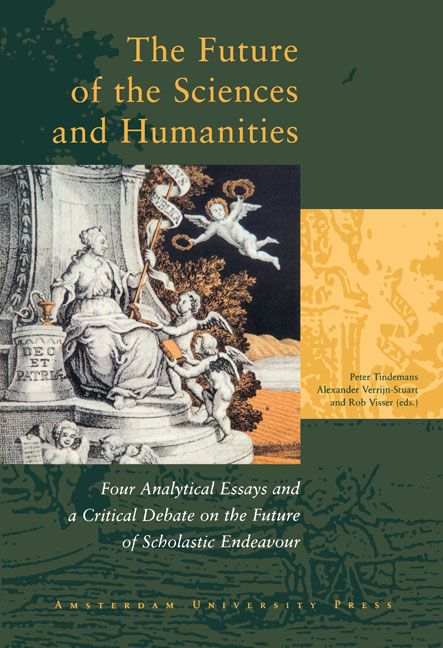 The Future of the Sciences and Humanities
The Future of the Sciences and Humanities Book contents
- Frontmatter
- Preface
- Contents
- 1 The Sciences and Arts Debate A review and some conclusions
- 2 Historical and Structural Approaches in the Natural and Human Sciences .
- The Role of Laws and Contingency in History
- 3 Science and Society in Flux
- Does A New Kind of Science Require a New Kind of Scholar or a New Kind of University?
- 4 Science for the 21st Century
- Redrawing Disciplinar Boundaries – but to What Degree?
- 5 Science and Democracy
- Science and Democracy: a Difficult Relationship: ‘An enlightened and elitist essay on an unresolvable problem’
- 6 Epilogue
- 7 Appendix
2 - Historical and Structural Approaches in the Natural and Human Sciences .
Published online by Cambridge University Press: 03 February 2021
- Frontmatter
- Preface
- Contents
- 1 The Sciences and Arts Debate A review and some conclusions
- 2 Historical and Structural Approaches in the Natural and Human Sciences .
- The Role of Laws and Contingency in History
- 3 Science and Society in Flux
- Does A New Kind of Science Require a New Kind of Scholar or a New Kind of University?
- 4 Science for the 21st Century
- Redrawing Disciplinar Boundaries – but to What Degree?
- 5 Science and Democracy
- Science and Democracy: a Difficult Relationship: ‘An enlightened and elitist essay on an unresolvable problem’
- 6 Epilogue
- 7 Appendix
Summary
ABSTRACT. In developing their models of the world, the sciences have traditionally drawn on two general approaches. One regards the world as the result of historical events and contingencies, whereas the other portrays it as the consequence of systematic constraints and regularities. The comparative merits of these approaches have been the subject of a long debate in intellectual history. This debate has been conducted in different contexts and terms, however, so its unity has hitherto not been appreciated. The debate was pursued in one form in the nineteenth-century German discussion of the methods of the human sciences; in another form, it has been pursued in recent controversies about the role of natural laws and historical contingency in the life sciences. The aim of this essay is to demonstrate the continuity of the debate between the two approaches over the past 150 years, to study its evolution, and to draw lessons from it for new resolutions of the outstanding issues.
INTRODUCTION
How does the world come to have the structure that it has? Answering this question is traditionally regarded as a central aim of the sciences. To tackle it, the sciences have developed two fundamental and general approaches which suggest the form that the answer should take. In one approach, the structure of the world is a result of contingent historical events and processes. In the other approach, it is a consequence of constraints and regularities that are general and necessary. I shall call these the historical and the structural approach, respectively.
Each of these approaches has impressive achievements to its credit. Each appears natural and compelling in certain domains of inquiry. Our view of art, for example, is based largely on the premise that artworks spring from unpredictable human creativity, and that they can be fully understood only by retracing the contingent evolution of the artist and of society. Our modern understanding of the cosmos, by contrast, rests largely on the assumption that laws of nature provide an invariant framework within which the universe unfolds.
The two approaches have a long history. They can be discerned in the philosophies of Plato and Aristotle. They are even more clearly visible in the two world views that have most shaped modern Western culture: the Enlightenment notion of a rationally ordered world and the Romantic ideal of the Promethean self-development of the individual.
- Type
- Chapter
- Information
- The Future of the Sciences and HumanitiesFour Analytical Essays and a Critical Debate on the Future of Scholastic Endeavor, pp. 19 - 54Publisher: Amsterdam University PressPrint publication year: 2002
- 1
- Cited by


